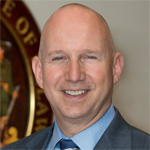
Facebook Twitter Google+ Instagram Pinterest Flickr YouTube
Written on: January 17th, 2014 in Education
Too few college-ready low-income students attend and graduate from college, which limits their economic mobility for the rest of their lives. More than sixty percent of jobs will require education beyond high school by the end of the decade, but research shows that many low-income students who have demonstrated college readiness don’t even apply.
The White House’s convening of more than 80 college and university presidents this week was an important step forward. Attendees made concrete commitments to increase college access, particularly for low-income students, and expressed the sense of urgency needed to make progress. However, public policy improvements are also required to ensure students can maximize their educational potential. States have a responsibility to come together in working to meet this national challenge.
In Delaware, we call our initiative “Getting to Zero.” The idea is simple. In Delaware, 27% of our college ready low-income students don’t even apply to college, and 1,000 of our college-ready students don’t enroll anywhere. We believe that zero of our college-ready students should fail to apply and attend college.
In the fall, we launched a partnership with the College Board that follows research from Stanford’s Caroline Hoxby and Harvard’s Christopher Avery showing that we can help low-income students take advantage of college opportunities they’ve earned simply by better informing them of their options. We’re providing all of them with information on college affordability and financial aid, materials to help them choose the best institutions for them, and application fee waivers, which have traditionally been far too complicated to obtain.
Our highest-achieving low-income students received a letter signed by all of the Ivy League schools, Stanford, and MIT, congratulating them on their accomplishments and letting them know that many students attend those institutions at no cost. And our other college ready students heard from other universities interested in having them matriculate.
We were able to identify the students who need our support because we invested in a data system to follow their progress, and because we provide free school-day PSAT and SAT testing for every student.
We are proud of the College Board partnership but it’s only one step. Students deserve our support in pursuing higher education at every step.
At the White House, we announced four follow-up initiatives, already happening in some Delaware schools, which will go statewide and reflect our commitment to improving college access for our students.
First, we need to make sure they apply. So every high school in the state will make time for students to fill out their applications in computer labs, and write college essays in our English classes.
Next, we have a pilot program in two of our 19 school districts that assists families with filling out the FAFSA form, individual school aid forms, and scholarship applications. We will expand this program throughout the state.
Third, when they get into school, our students should be recognized – to make them feel good but also to set an example for younger students. Like college football has national signing day, all of our schools will have Acceptance Day during which students celebrate their college decision.
Finally, even after they’re admitted, many of our most vulnerable youth still don’t make it to campus for the first day of class. We will follow up throughout the summer with emails, post cards, and phone calls to make sure all of our at-risk students stay on track.
As a small state, Delaware has some advantages in carrying out a plan like this, but our goals are attainable everywhere. Larger states can partner with counties, cities, and individual school districts, which can then take on much of the responsibility for executing the plans.
I know that many of my fellow governors share the sense of urgency expressed by the President and First Lady, and by the education leaders who were present at the White House event. States have an opportunity to build on these commitments.
As with the Common Core, which states developed together to ensure students are meeting college and career-ready standards, governors should agree on a vision for expanding college access, while allowing enough flexibility in implementation to meet their individual needs. I look forward to joining with my colleagues in other states to make a common commitment to “getting to zero” and come together to share ideas and develop plans that work for each of us.
We have the greatest system of higher education in the world – from our community colleges through our Ph.D. programs – and by working together we will make those institutions available to as many of our young people as possible.
Our at-risk students need our support and we need them to make it as far as they can go. The country’s economic competitiveness, and our promise of economic opportunity for all Americans, depends on it.
This blog was originally published on The Huffington Post.